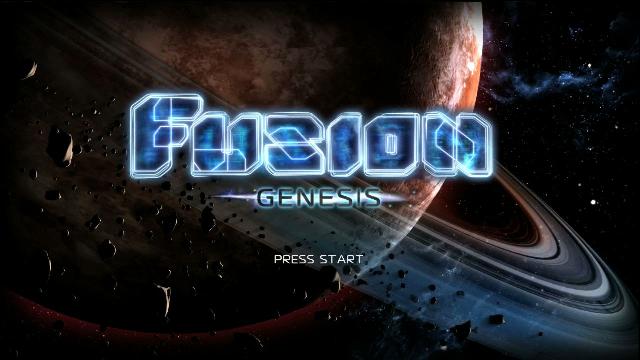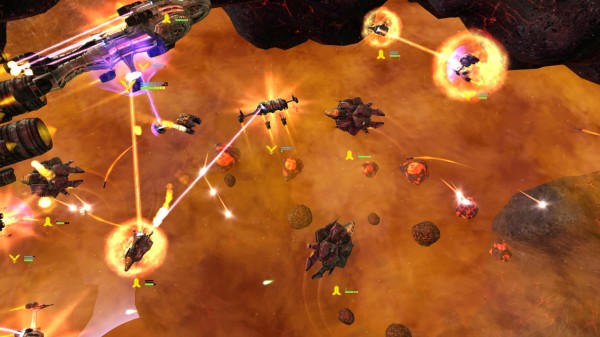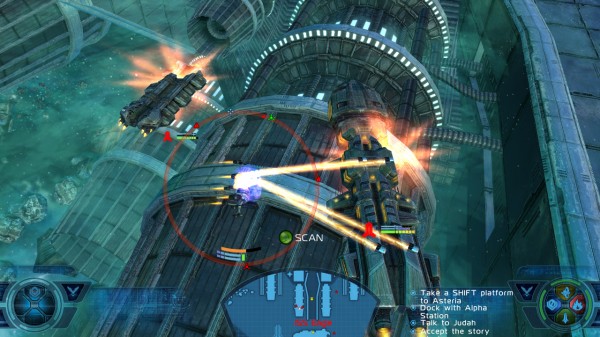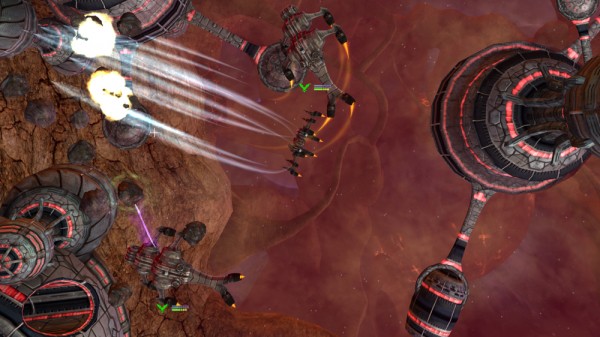Fusion: Genesis review (XBLA)
Fusion: Genesis was developed by Starfire Studios and published by Microsoft Studios. It was released November 9, 2011 for 800 MSP. A copy was provided for review purposes.
Fusion: Genesis certainly isn’t the first game on XBLA to put you in control of a spaceship but it is definitely the most ambitious. While it may not have the scope or freedom of a game like EVE Online it comes closer than you might expect.
After a brief tutorial area in which you are given the basics on controls and combat you are dropped into the world and allowed to go at your own pace. This means taking on missions, joining factions, mining ore and of course buying bigger, better ships.
Here’s what we liked:
Space is pretty – While the perspective is locked to a top down view, there’s still a lot of depth in the environments of Fusion: Genesis. Some of the backgrounds are so elaborate that it’s hard not to get distracted by the massive structures and planets floating around in the distance. While the graphics may not be the best you’ll ever see, it can’t be denied that this is a beautiful game. The ships and structures all look great and there’s some excellent weapon effects and beefy explosions to round things out. Sadly there’s no real damage model on the ships, they just start to smoke before eventually bursting into flames and exploding when their health goes down.
Pew pew pew – Combat in Fusion: Genesis is essentially a twin stick shooter, though you do control lasers and missiles with the triggers. For a game like this it seems a bit simple at first but as bigger ships become available you can equip them with more weapons. So in addition to projectile type weapons you will be able to use the aforementioned lasers and missile. It makes for quite a frantic light show but it can be quite satisfying, as you take on multiple ships in a huge space battle.
Lots of RPGing – It’s slow going but there’s a somewhat satisfying progression in Fusion: Genesis. You level up your character, your faction affiliation and your Sentients. Sentients being little AI robot buddies that stay close to your ship, some are designed for combat while others will help with defense. Faction levels allow you to purchase higher level ships while your Sentient and character levels allow you to distribute skill/attribute points. With all those systems in play it’s fairly easy to build a character/ship/Sentient combo to suit a lot of different types of play. Whether you want to charge right into the middle of a battle, all guns blazing or hang back and snipe enemies while buffing your allies.
Here’s what we didn’t like:
Lost in space – Outside of the opening tutorial Fusion: Genesis does almost nothing to explain its many many systems. There is a “How to play” section in the options menu but it’s mostly a guide to the HUD elements rather than an advanced tutorial. It’s frustrating to get three hours into a game and discover there are multiple systems you have missed. There were important systems we didn’t discover till two or three hours of playing, more we still aren’t sure we understand. It’s fair to say not every game needs to hold your hand but a game as complex as this most definitely needs to give players at least a helpful nudge now and then.
Bad UI – The aforementioned systems might have been easier to discover were it not for the games other big problem, a cluttered and generally poorly executed user interface. Pressing the back button brings up a menu with your character, ship, Sentient and mission stats, each of which have their own subset of menus. Some of the menus are interactive, allowing you to look through equipment or distribute skill points but initially it’s not clear what’s a menu and what’s just stats.
Glacial pace – When taking on a mission in Fusion: Genesis you are asked if you want to set it as your “primary mission”. Saying no to this question doesn’t make it a secondary objective, it just declines the mission. You see, rather bafflingly for a game that seems set to emulate an MMO, you can only take on one mission at a time. As a result progress in the game is incredibly slow, even though each mission takes no more than 10-15 minutes it becomes a chore returning to base after every single one. It’s hard to understand why the mission system is so restrictive, we’d love nothing more than to grab a bunch of missions and travel around the game world tackling them all.
Half-hearted ambition – While it isn’t an MMO by any stretch, Fusion: Genesis is always online (to the point where you can’t even pause it). There are always other players in your world, flying around doing their own thing. You can also team up into squadrons with up to three other players, although we didn’t have much success with this due to various errors and obtuse systems. It’s a great concept, a persistent online world which players can take part in. However it ends up feeling meaningless as players have no real effect on the world or each others games.
We have no doubt that Fusion: Genesis will appeal to someone, the type of person who is willing to figure out its systems for themselves. It’s a type of game we haven’t seen on XBLA before and probably won’t see again for a long while. In that regard Fusion: Genesis is the best we’re going to get for now, while it’s not the best we could’ve hoped for there is still some fun to be found here. You just have to be willing to dig for it. For everyone else though there are just too many unexplained and tedious systems to trawl through before any kind of fun or satisfaction can be had.
Score: Try It





